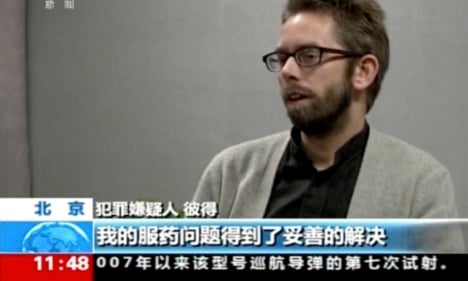“I'm back in Sweden now. I arrived this morning, after various delays but I'm in my hometown now with my parents,” said Peter Dahlin of the Chinese Urgent Action Working Group.
“I'm happy to be back but three of my colleagues and close friends are still being held,” he told Swedish radio.
Dahlin, who suffers from Addison's disease, said China had released him on Monday for “medical and diplomatic reasons”.
The campaigner was detained earlier this month by China for allegedly posing a threat to national security. But on Tuesday Chinese officials announced the Swede had been made to leave the country.
“We have deported him,” Hua Chunying, a foreign ministry spokeswoman, told a regular press briefing.
Michael Caster, a US-based spokesman for Dahlin's group, said on Twitter that the Swede had been “expelled from China”.
His Chinese girlfriend, who had also been held “is no longer in detention but, contrary to some assertions, has not left the country”, he added.
Peter Dahlin has been expelled from China. Pan Jinling is no longer in detention but, contrary to some assertions, has not left the country.
— Michael Caster (@michaelcaster) January 26, 2016
“I welcome the fact that Peter Dahlin can now be reunited with his family in Sweden. This is the result of close contacts between the Swedish foreign ministry and Chinese representatives,” Foreign Minister Margot Wallström said in a statement following his release.
Dahlin, who worked for the Chinese Urgent Action Working Group, disappeared on January 4th as he prepared to board a flight to Thailand, and appears to have been caught up in a crackdown on human rights lawyers.
His detention came as China considers a new law to control the activities of foreign non-governmental organisations (NGOs), which has raised widespread concern among overseas groups. Dahlin's group has said it offered training to lawyers who have tried to use China's tightly-controlled judiciary to redress apparent government abuses.
State broadcaster CCTV last week aired footage of a dazed and harried looking Dahlin apologising to China for his alleged actions.
Another Swedish national, China-born Hong Kong bookseller Gui Minhai, disappeared from Thailand late last year before reappearing on Chinese national television in police custody.
He confessed to a mainland drink-driving offence dating back years and said he did not want Stockholm to interfere with his case.
Gui was rumoured to be preparing a tell-all book about the love life of President Xi Jinping.
Wallström said she remained “greatly concerned” about Gui.
“Our efforts to get a clear picture of his situation and the possibility to visit him continue with undiminished force,” she said.
Beijing only rarely accuses foreigners of endangering state security, a crime which can involve a heavy sentence.
While forced public confessions are an old practice in Communist China, there has been a resurgence of such incidents since President Xi took power in 2012.
The European Union's ambassador to China, Hans-Dietmar Schweisgut, had called Dahlin's arrest and televised confession “part of a worrying trend and call into question China's respect for the rule of law and for its international human rights obligations.”
Journalism advocacy group Reporters Without Borders last week urged the European Union to impose sanctions on Chinese state media over the “forced confessions”.


 Please whitelist us to continue reading.
Please whitelist us to continue reading.